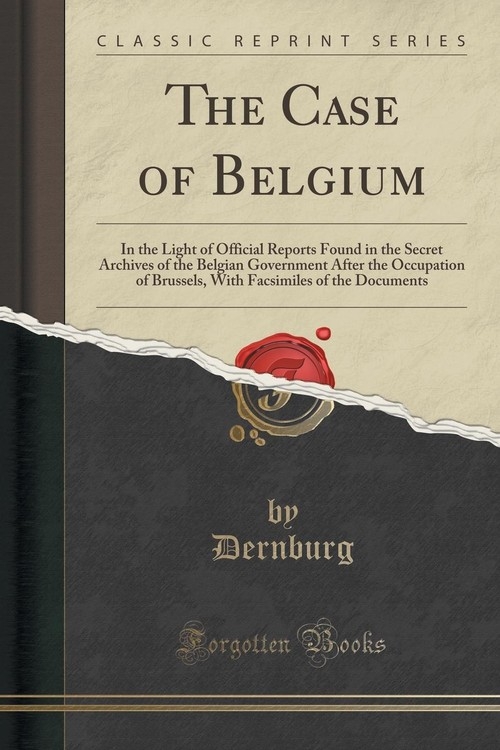The Case of Belgium In the Light of Official Reports Found in the Secret Archives of the Belgian Government After the Occupation of Brussels, With Facsimiles of the Documents (Classic Reprint)
Dernburg Dernburg
The Case of Belgium
In the Light of Official Reports Found in the Secret Archives of the Belgian Government After the Occupation of Brussels, With Facsimiles of the Documents (Classic Reprint)
Dernburg Dernburg
- Wydawnictwo: FB &c Ltd
- EAN: 9781332109579
- Ilość stron: 22
- Format: 15.2x22.9cm
- Oprawa: Miękka
Niedostępna
Opis: The Case of Belgium - Dernburg Dernburg
Excerpt from The Case of Belgium: In the Light of Official Reports Found in the Secret Archives of the Belgian Government After the Occupation of Brussels, With Facsimiles of the Documents
Herewith are published facsimiles of papers found among the documents of the Belgian General Staff at Brussels, referring to arrangements between the English Military Attache and the Belgian Minister of War regarding British intervention in Belgium.
It will be remembered from the British White Book that in November, 1912, a correspondence passed between Sir Edward Grey and the French Minister in London, in which it was stated that British and French military and naval experts had consulted together from time to time as to plans to be followed in case of war, and it was stated in this correspondence that in accordance with such prearranged plans the French fleet would stay in the Mediterranean to safeguard the joint interests there, whereas the British fleet would safeguard their interests in the north. Of this correspondence the members of the British Cabinet remained ignorant until the Cabinet meeting immediately preceding the written statement by Great Britain on August 2 that in case a German fleet attacked the French coast or passed into the channel, England would give all the assistance in her power (British White Papers No. 148), and it was also, of course, concealed from the British public until the speech of Sir Edward Grey on August 3. It will be remembered that in consequence of this revelation the British Minister of Commerce, Mr. John Burns, and two other members, Lord Morley and Mr. Trevelyan, left the British Cabinet under protest; that the leader of the British Labor Party, Mr. Ramsey McDonald, resigned from the leadership and that Mr. Arthur Ponsonby in his famous letter denounced Sir Edward Grey's practices.
Mr. Ponsonby said that time and again they had been assured that there were no obligations whatsoever on the part of Great Britain to come to France's assistance and yet they found themselves now so hopelessly entangled that as a matter of fact the British Government could not back out.
The fact of these consultations, by which, of course, all the plans of mobilization of both the British and French armies were disclosed to the two allies and which include the landing of English troops in France, is now fully established by the annexed documents. They show that these conversations were also held with Belgium, that plans had been concerted to invade Belgium with an army of 100,000 men by way of three French ports - viz., Dunkirk, Calais and Boulogne - and that the British plans even considered a landing by way of the Scheldt, thus violating also Dutch neutrality.
The documents, giving all the details as translated and showing that Belgian railway cars were to be sent to the named French ports in order to transport the British troops into Belgium, are dated from 1906.
The Belgian Minister at Berlin, Baron Greindl, a well known Belgian patriot, protested to his government. The heading of his protest is also given in facsimile. In it he said that it was not quite safe to trust to the British and French to keep the Belgian neutrality, that it was not wise to take all measures only against a German infraction of Belgian neutrality and that the British spirit was clearly shown by the words of Colonel Barnardiston that the Scheldt might be used for transporting troops into Belgium.
Furthermore, it will be remembered that the British and French Governments violently protested when the plans were made public that the Dutch Government intended to fortify the mouth of the Scheldt in 1906. But in 1912, when the Balkan crisis became acute, the British went one step further. When Colonel Bridges, in a conversation with General Jungbluth, the chief of the Belgian general staff, said that England was ready to strike, that 160,000 men were ready to be landed and that they would land them
Szczegóły: The Case of Belgium - Dernburg Dernburg
Nazwa: The Case of Belgium In the Light of Official Reports Found in the Secret Archives of the Belgian Government After the Occupation of Brussels, With Facsimiles of the Documents (Classic Reprint)
Autor: Dernburg Dernburg
Wydawnictwo: FB &c Ltd
Kod paskowy: 9781332109579
Języki: angielski
Ilość stron: 22
Format: 15.2x22.9cm
Oprawa: Miękka


























